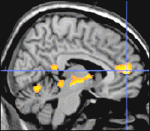Nov 23, 2005
Hypnosis can stop Stroop effect
Via Neurodudes
A new experiments by Raz et al., recently published in the Proceedings of the National Academy of Science, found that hypnotic suggestion affects cognitive control by modulating activity in specific brain areas, namely visual areas and the anterior cingulate cortex, which is involved in conflict monitoring.

Raz et al. Hypnotic suggestion reduces conflict in the human brain, Proceedings of the National Academy of Sciences 2005;
Abstract: Many studies have suggested that conflict monitoring involves the anterior cingulate cortex (ACC). We previously showed that a specific hypnotic suggestion reduces involuntary conflict and alters information processing in highly hypnotizable individuals. Hypothesizing that such conflict reduction would be associated with decreased ACC activation, we combined neuroimaging methods to provide high temporal and spatial resolution and studied highly and less-hypnotizable participants both with and without a suggestion to interpret visual words as nonsense strings. Functional MRI data revealed that under posthypnotic suggestion, both ACC and visual areas presented reduced activity in highly hypnotizable persons compared with either no-suggestion or less-hypnotizable controls. Scalp electrode recordings in highly hypnotizable subjects also showed reductions in posterior activation under suggestion, indicating visual system alterations. Our findings illuminate how suggestion affects cognitive control by modulating activity in specific brain areas, including early visual modules, and provide a more scientific account relating the neural effects of suggestion to placebo.
16:00 Posted in Meditation & brain | Permalink | Comments (0) | Tags: Positive Technology, meditation







The comments are closed.